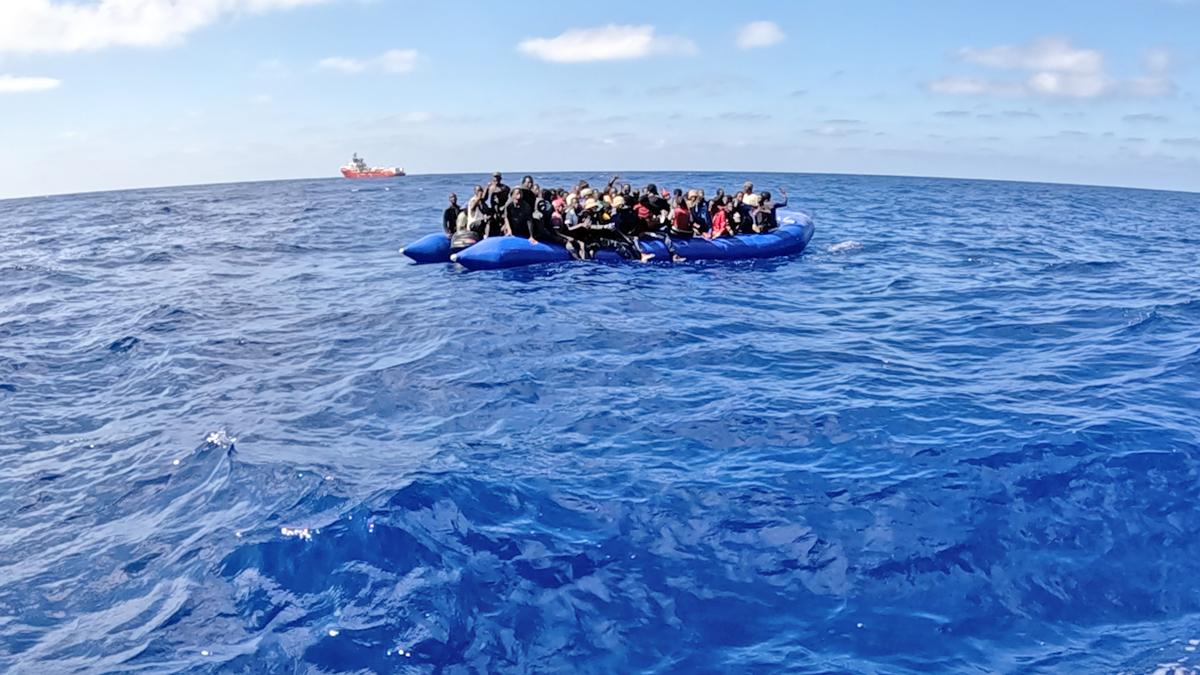Fourteen days across the Atlantic, perched on a ship’s rudder
- Published
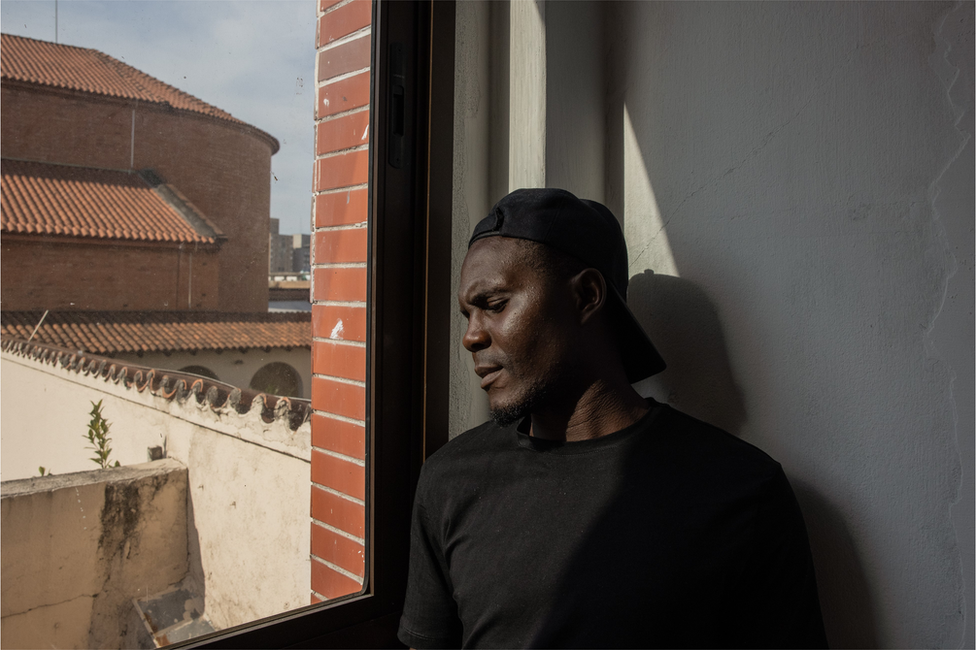
Roman Friday, one of the stowaways, in São Paulo. "I wanted a brighter future," he said (Victor Moriyama/BBC)

Four Nigerian stowaways set out for Europe on the rudder of a tanker. They had no idea they were bound for Brazil, and a two-week ocean voyage that would nearly kill them.

A little after midnight on 27 June, Roman Ebimene Friday gathered up the food he had been collecting for a few months and set out in the dark for the large commercial port in the city of Lagos, Nigeria. Earlier that day, Friday had spotted a 620-foot (190m) tanker docked at the port and decided that it would be the ship to deliver him to Europe.
Friday was aiming for the tanker's rudder - the only accessible point on its massive hull for a person who isn't supposed to be aboard. There was no way to bridge the gap from the dock to the rudder, other than convince a fisherman to ferry him across. "He was a holy man, that fisherman," Friday recalled. "He did not ask for money. He could see that I wanted to leave."
The fisherman sidled up to the rudder and Friday, 35, pulled himself up, hauling his food bag behind him on a rope. As he steadied himself he saw, to his surprise, three faces in the dark. He was the last of four men with the same idea. "I was scared, at first," Friday said. "But they were black Africans, my brothers."
Fearful of being caught, the four men perched silently on the rudder for the next 15 hours. At 5pm, they felt the ship's giant engines shudder to life. Over the din, they shouted a few words. They were all aiming for Europe. They expected to be shipmates for as long as a week.
The tanker, called the Ken Wave, pushed out from the port and headed to sea - the beginning of a perilous two-week ocean voyage that would bring the stowaways close to death.
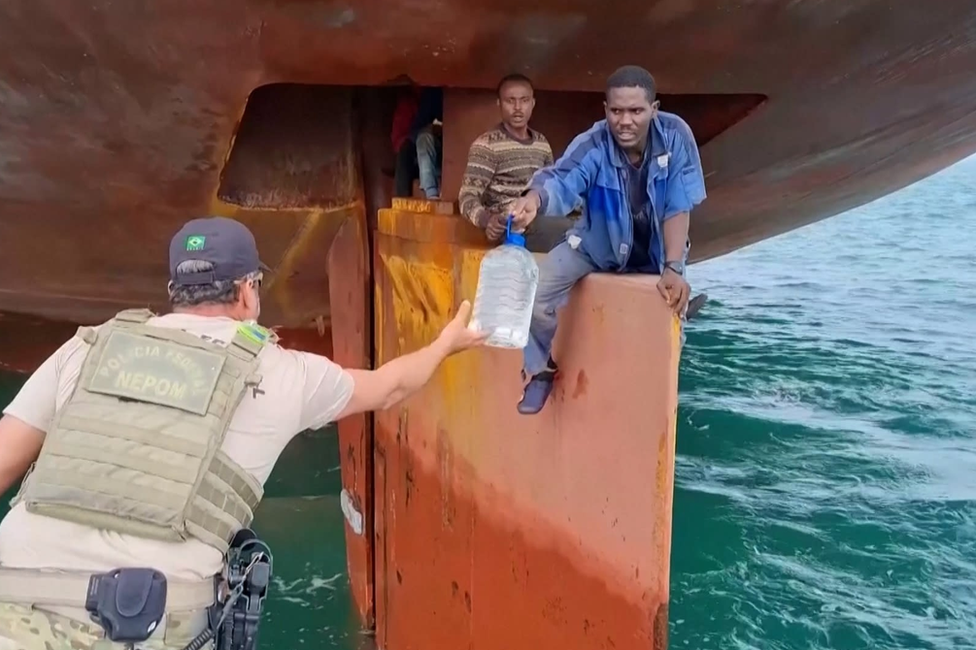
Roman Friday accepts water, perched on the rudder that took him and three other men to Brazil
Day one
As Lagos receded behind them, the men tried and failed to find comfortable positions on the rudder, which moved constantly as it steered the ship. There was precious little space to stand, and the only place to lie was in one of two small nets strung precariously over the water, by previous stowaways, Friday assumed.
It can be hard to understand, from the outside, what drives a person to risk their life on a rudder or a rickety boat across the Mediterranean. But the decision comes easy when you have already lost hope, Friday said.
"In Nigeria there are no jobs, no money and no way for me to feed my younger brothers and my mother," he said. "I am the first born son and my father died 20 years ago, so I should take care of my family, but I cannot."
Instead he had spent three years living on and off the street in Lagos, trying to find work. Each day in Nigeria was a gauntlet of "crime and sin," he said. "People fighting, killing each other, terrorists attacking, kidnappers. I want a brighter future than that."
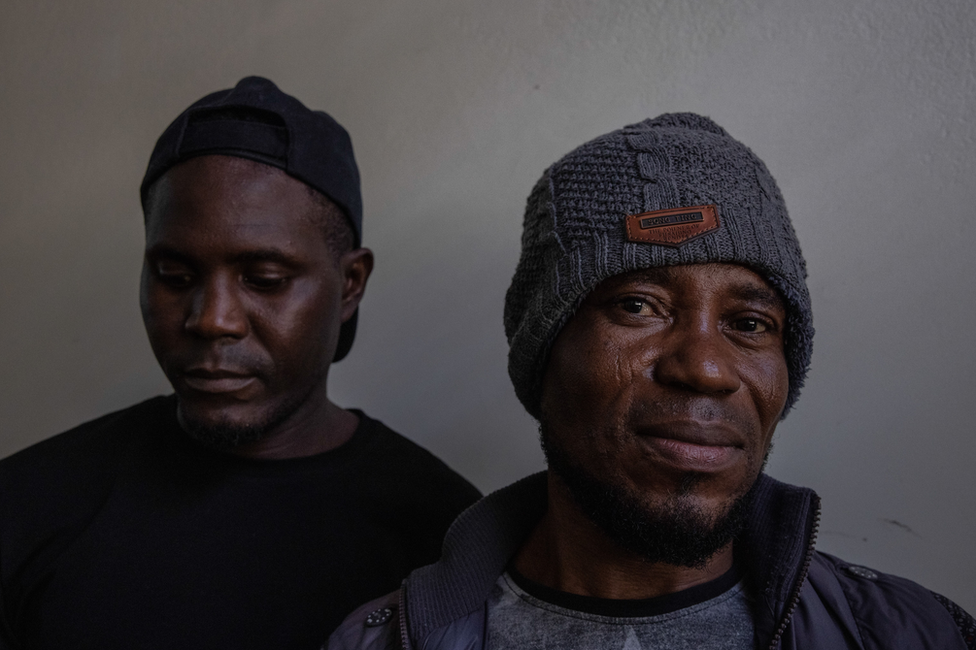
Friday, left, and Thankgod Yeye, right. "We became brothers on the way," Friday said (Victor Moriyama/BBC)
Perched next to Friday on the rudder of the tanker was Thankgod Opemipo Matthew Yeye, a Pentecostal minister, businessman and father of two whose peanut and palm oil farm had washed away in the devastating floods that hit Nigeria last year. There had been no fallback or insurance to cover the loss.
"My business was destroyed and my family became homeless. And that was the genesis of my decision to leave," he said.
Yeye's decision became final after the recent presidential election, which was marred by anomalies and allegations of vote rigging. "The election had been our hope," he said. "But we know Nigeria well, we know the system is corrupt." So, without telling his family, he left his sister's home at night and set out for the port, where he knew the Ken Wave was waiting to depart.
Nigeria has seen an exodus of people like Yeye and Friday in recent years, via regular and irregular routes, driven by recessions and record unemployment levels. Many travel across the Sahara and the Mediterranean, where at least 1,200 Nigerians have died already this year, according to the UN.
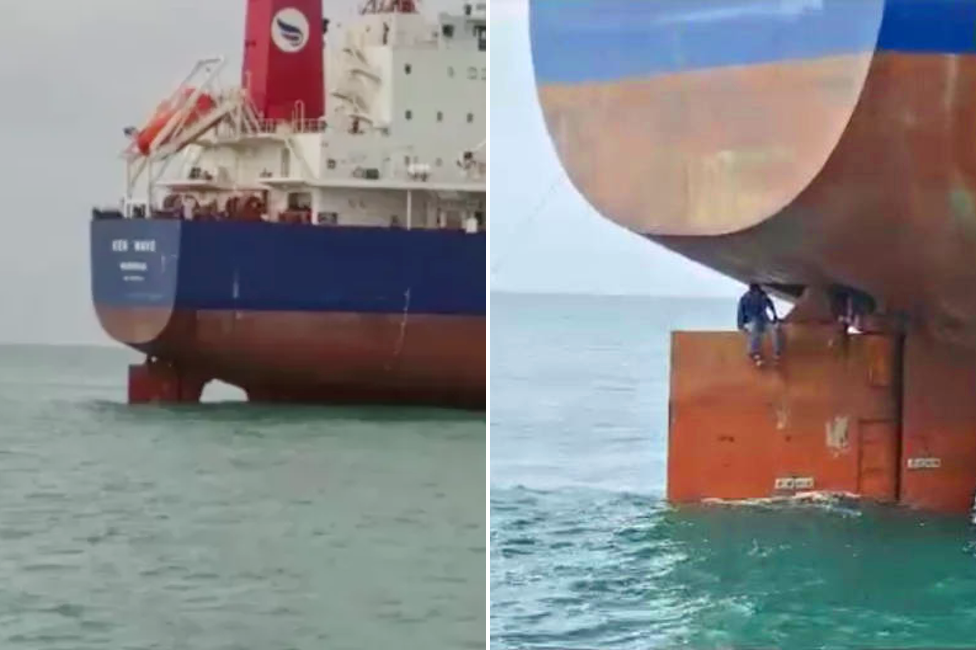
Roman Friday sitting atop the rudder that carried him across the Atlantic
Some choose to stow away. Last year, three men climbed on a rudder in a similar fashion to Friday and Yeye, and their journey took them 2,500 miles to the Canary islands, an entry point to Spain. Friday and Yeye believed they were following a similar route.
With their two companions, William and Zeze, they passed the first few days on the ship in a mixture of boredom, discomfort, and fear, talking only a little, praying often and trying to stay awake, as the Ken Wave pushed into the vast stretch of the south Atlantic for the 3,500 mile journey to Brazil.
Day five
In some ways, ship stowaways are safer than those who cross parts of the Sahara on foot or the Mediterranean on rickety wooden boats. But as day five passed, Friday and Yeye began to reckon with the specific dangers of their situation.
They were already weak from rationing their food and tired from lack of sleep. They tied a rope around their waists when they needed to pee off the side of the rudder. When the water was rough, waves lashed them. "We were all scared of the big waves," Yeye said. "I had never seen the ocean before but I used to watch documentaries about storms and I had seen big ships rocked from side to side by waves." Sleep was virtually impossible. "You try not to even close your eyes," Friday said. "The rudder turns 24 hours a day, seven days a week, you have to constantly be alert."
The nets came loose and had to be inexpertly refastened. They lay in them again but Friday thought only of being awoken by the sudden feeling of falling and the hit of cold below. "If the net breaks, you go straight into the water and you are gone," he said. And you really were gone. There's no chance of rescue at sea when no-one knows you're lost.

Day passed into night and into day again. The men grew weaker and stopped talking entirely. Friday kept track of the time on his wristwatch. He tried to remember the day. The nets came loose again and were refastened. The food was rationed in smaller parcels, the water in smaller sips. Their mouths began to dry out. Their stomachs ached. They tried to remain vigilant and tried not to fall in.
Day 10
Day 10 brought the moment the four had been quietly dreading. Some time in the morning, they ate the last of their food and drank the last of their water. All four were already painfully hungry from spacing out the meagre rations they had. "This was the hardest moment of all," Yeye said. "My mouth was dry and completely cracked. For the first time in my life I really understood the meaning of water."
There were a few lighter moments. Yeye told his brothers he was praying for rain and they laughed at him. What are you going to do with rain? they cried. How will you collect it? Rain was only dangerous for them, they chided. The laughter subsided. Hour by hour, they became more thirsty. Time seemed to move more slowly.
The next day, Friday managed to attach a torn cellophane biscuit wrapper to a length of rope and lower it into the ocean, he said, and collect small mouthfuls of salty water for them to drink. They licked toothpaste.
On day 12, sick from salty ocean water, one of the other men began to vomit from the side of the rudder block. "He was looking straight down into the water and vomiting," Friday said. "He had no strength to hold himself. He was about to fall. I was the only person who had strength left and I had to grab hold of him."
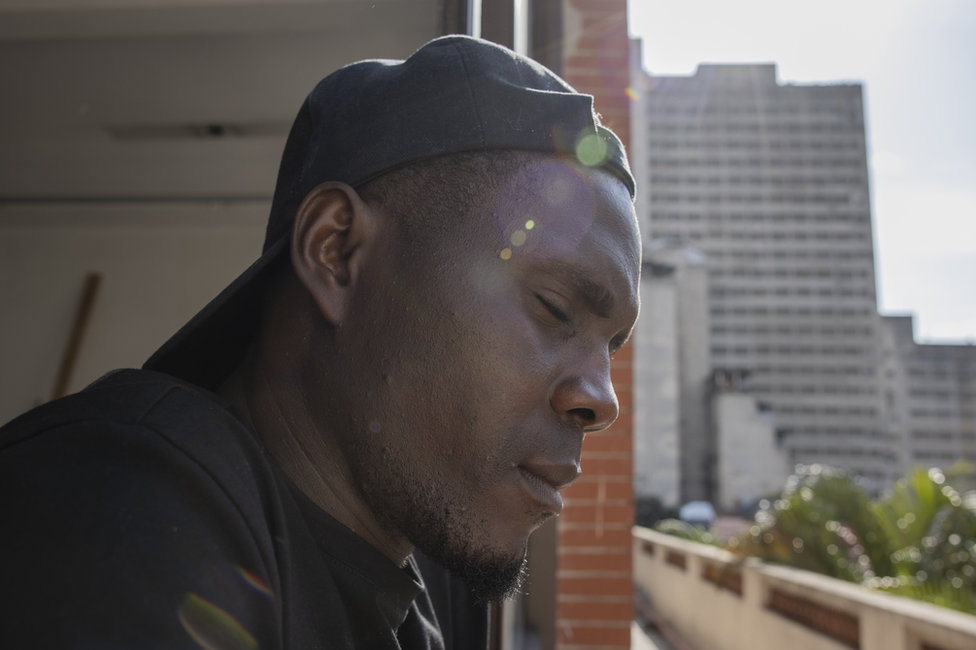
Roman Friday in his new home in São Paulo (Victor Moriyama/BBC)
The men were entering the phase of hunger and thirst that brings you close to death. In an effort to distract himself, Friday began to sit on the edge of the rudder alone, one leg hanging either side, scanning the ocean in vain for anything to interrupt the long unbroken line of the horizon.
What the ocean gave him, on the 13th day of the voyage, was a whale.
"The first time in my life I have seen such a thing!" he said, laughing at the memory. "If I told anyone at home I had seen a whale they will say I am lying. But I sat on the rudder and I saw a whale. And I forgot I was hungry and thirsty. I watched the whale and it was like watching creation. A holy moment."
Day 14
As the first light appeared on the horizon on day 14 of the voyage, Friday was back on the edge of the rudder, staring into the distance, when he felt the ship's mighty engines begin to slow. Then, in the dim light, in the distance, he saw what looked like land. Then buildings. Then a boat.
The Ken Wave was stopping off the coast to take on a fresh crew, and the resupply boat spotted the men. "Do you know where you are?" came a shout. Friday tried to shout back that he had no idea, but his throat was too dry. The boat left, then two hours later, in the clearer light, a police dinghy appeared. An officer stretched out a bottle of water to Friday. "You are in Brazil," he said.
Safely back on dry land, the migrants used borrowed phones to call their families. Friday and Yeye's two fellow migrants, William and Zeze, decided to take up an offer of returning directly to Nigeria. Friday and Yeye decided to make Brazil their home. "We are joyful to be here," Yeye said. "It is a new beginning."
They will likely face challenges. Migrants have automatic rights to healthcare and other benefits in Brazil, but African migrants often face racism and struggle to find well-paid work. Friday and Yeye have been taken in by a shelter in São Paulo and are being assisted by a Catholic mission, Missao Paz, with Portuguese lessons and other support. Yeye wants to start a new business and bring his wife and children over.
Friday is focused on the more immediate future. "I am in a new place, I am trying to adapt, I am trying to learn the language," he said. The first journey he had ever made out of Nigeria had nearly killed him, but as the days passed after his rescue, he felt the hopelessness that had dogged him back home begin to ebb, he said.
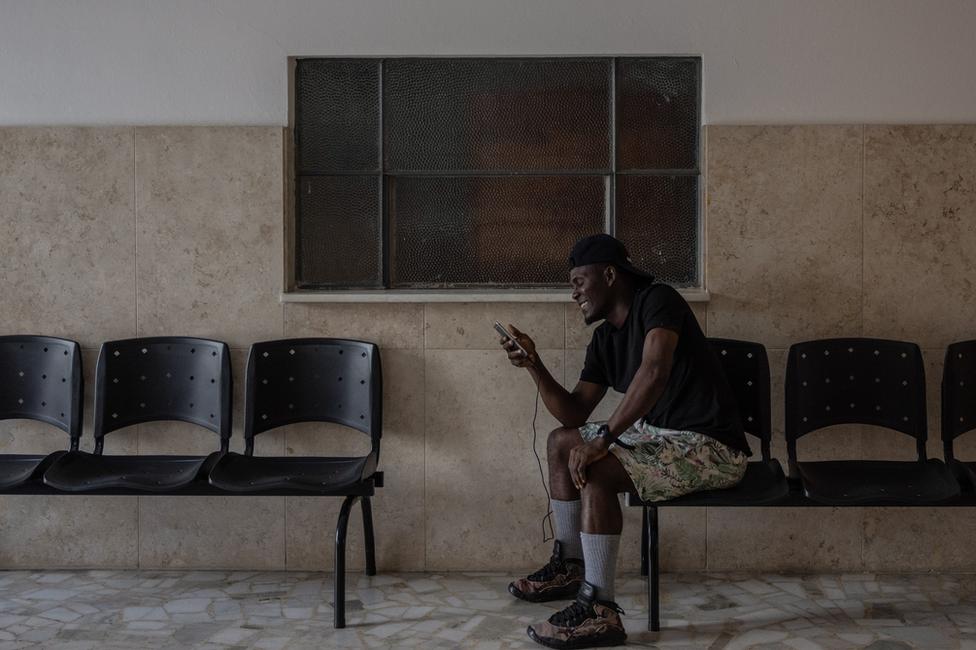
Roman Friday makes a video call to his family back home (Victor Moriyama/BBC)

All images copyright
Related topics
- Published9 August 2023
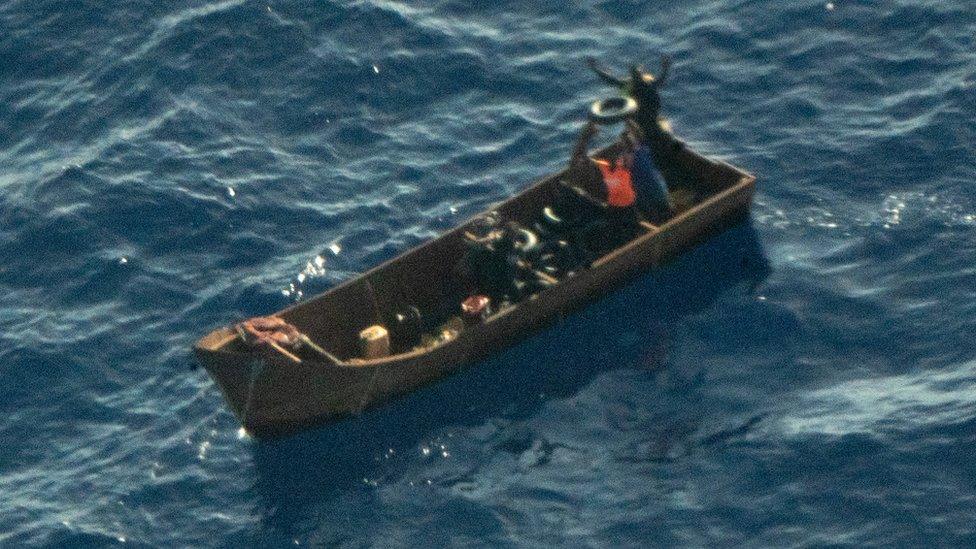
- Published11 July 2023
